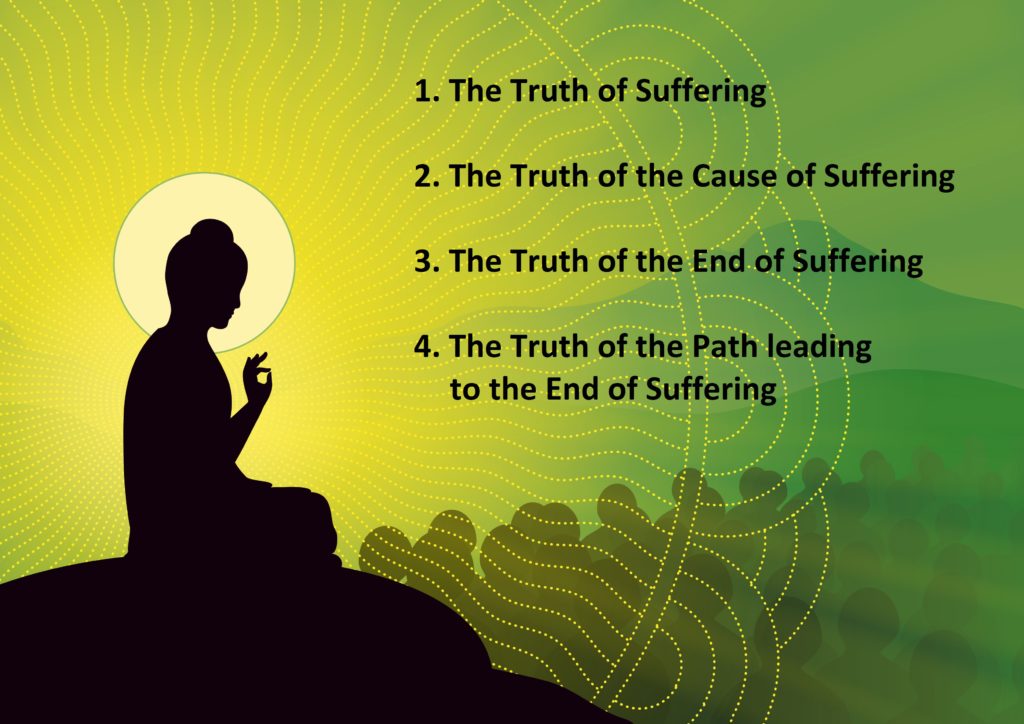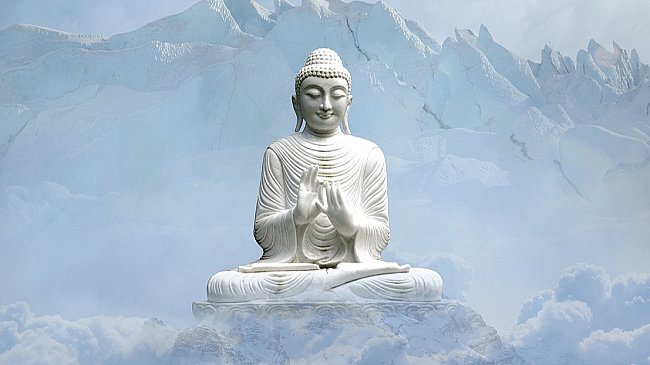Buddhism, originated in ancient India, is a spiritual tradition that encompasses a wide range of beliefs, practices, and philosophical teachings. Central to Buddhism are the Four Noble Truths and the Eightfold Path, which provide a framework for understanding the nature of suffering and the path to its cessation. Buddhism is not just a set of beliefs but a path to understanding the nature of reality and achieving liberation from suffering.
The Four Noble Truths
The Four Noble Truths are the foundation of Buddhism, articulated by Siddhartha Gautama, the Buddha, over 2,500 years ago. The four Noble Truths are as follows:
- The Truth of Suffering (Dukkha): The first noble truth acknowledges the existence of suffering in life. Suffering is not just physical pain but also includes dissatisfaction, impermanence, and the inherent unsatisfactoriness of existence.
- The Truth of the Cause of Suffering (Samudaya): The second noble truth identifies the root cause of suffering, which is craving (tanha) and attachment to worldly desires. It is the selfish desire for pleasure, existence, and non-existence.
- The Truth of the Cessation of Suffering (Nirodha): The third noble truth teaches that suffering can be ended. By eliminating craving and attachment, one can attain a state of liberation, known as Nirvana, where suffering ceases.
- The Truth of the Path to the Cessation of Suffering (Magga): The fourth noble truth outlines the Eightfold Path as the means to end suffering. It is a practical guide to living a life of wisdom, ethical conduct, and mental discipline.


The Eightfold Path
The Eightfold Path, also known as the Middle Way, is a set of guidelines that Buddhists follow to overcome suffering and achieve enlightenment. It is divided into three categories: wisdom (panna), ethical conduct (sila), and mental discipline (samadhi). The eight components of the path are as follows:
- Right View (Samma-ditthi): Right view is the correct understanding of the Four Noble Truths and the nature of reality. It involves seeing things as they truly are, without distortion or delusion.
- Right Intention (Samma-sankappa): Right intention is the commitment to ethical and mental self-improvement. It involves cultivating thoughts of renunciation, goodwill, and non-harming.
- Right Speech (Samma-vaca): Right speech involves speaking truthfully, kindly, and meaningfully. It also includes abstaining from gossip, harsh language, and divisive speech.
- Right Action (Samma-kammanta): Right action entails acting ethically and responsibly. It involves abstaining from killing, stealing, and sexual misconduct.
- Right Livelihood (Samma-ajiva): Right livelihood means earning a living in a way that is honest, ethical, and does not harm others. It involves avoiding professions that involve killing, stealing, or harming others.
- Right Effort (Samma-vayama): Right effort is the effort to cultivate positive qualities and eliminate negative ones. It involves cultivating mindfulness and awareness in all activities.
- Right Mindfulness (Samma-sati): Right mindfulness is the practice of being aware of the present moment, without judgment or attachment. It involves being mindful of the body, feelings, mind, and phenomena.
- Right Concentration (Samma-samadhi): Right concentration is the practice of developing a focused and concentrated mind. It involves practicing meditation to develop mental clarity and insight.
The Nature of Existence
At the heart of Buddhist philosophy is the concept of impermanence (anicca). Buddhists believe that all phenomena, including the self, are constantly changing and devoid of any permanent essence. This understanding of impermanence is a key component of the first noble truth, which acknowledges the inherent unsatisfactoriness of existence.
The Self
Buddhism rejects the concept of a permanent, unchanging self (anatta). Instead, it teaches that the self is a construct of the mind, created by the interplay of various mental and physical processes. This concept is closely related to the idea of impermanence, as the self is seen as constantly changing and devoid of any inherent essence.
Karma
Central to Buddhist belief is the law of karma, which states that every action has a corresponding effect. According to this law, virtuous actions lead to positive outcomes, while unwholesome actions lead to negative consequences. Karma is seen as a natural law that operates independently of any divine intervention, and it is believed to play a crucial role in determining one’s future rebirths.
Practical Application
Buddhism is not just a set of beliefs but a practical path to awakening and liberation. The teachings of Buddhism emphasize the importance of ethical conduct, mental discipline, and wisdom in achieving spiritual growth. Practicing meditation, cultivating mindfulness, and living a life of compassion are all central to the Buddhist path.
The Four Noble Truths and the Eightfold Path are not just theoretical concepts but practical teachings that can be applied in everyday life. By understanding the nature of suffering and its causes, one can begin to cultivate the qualities necessary for liberation. Practicing the Eightfold Path helps to develop wisdom, ethical conduct, and mental discipline, leading to a life of greater peace, happiness, and fulfillment.


Conclusion
The fundamental beliefs of Buddhism provide a comprehensive framework for understanding the nature of existence, the self, karma, and enlightenment. Central to these beliefs is the recognition of impermanence, suffering, and the importance of ethical conduct and mental discipline in achieving liberation. By following the teachings of Buddhism, individuals can cultivate wisdom, compassion, and inner peace, leading to a life of greater fulfillment and spiritual awakening. Also, the Four Noble Truths and the Eightfold Path are central teachings in Buddhism that offer a profound understanding of the nature of reality and a practical guide to living a life of meaning and purpose. By understanding the nature of suffering and its causes, and by cultivating wisdom, ethical conduct, and mental discipline, one can overcome suffering.
Related Video
FAQ
Do Buddhists believe in god?
Buddhists do not believe in a personal creator god but focus on the teachings of Siddhartha Gautama (Buddha), emphasizing self-reliance, mindfulness, and understanding the nature of suffering to achieve enlightenment and liberation from the cycle of rebirth (samsara).
What are the basic beliefs of Buddhism?
Buddhism teaches the Four Noble Truths: 1. Life is suffering (dukkha), 2.The cause of suffering is craving (tanha), 3. Suffering can cease by overcoming craving, and 4. The Noble Eightfold Path leads to the cessation of suffering, guiding followers toward ethical conduct, mindfulness, and wisdom.
Who founded Buddhism?
Buddhism was founded by Siddhartha Gautama, known as the Buddha, in the 6th century BCE in ancient India. He attained enlightenment after years of meditation and became the teacher of the principles that form the foundation of Buddhism.
FOLLOW US ON





Impressive summarys that are clear and simple
Thank you for your feedback
I’ve been following this blog for years and it’s amazing to see how much it has grown and evolved Congratulations on all your success!
This blog post has left us feeling grateful and inspired
I have been struggling with this issue for a while and your post has provided me with much-needed guidance and clarity Thank you so much
Your blog post had me hooked from the first sentence.